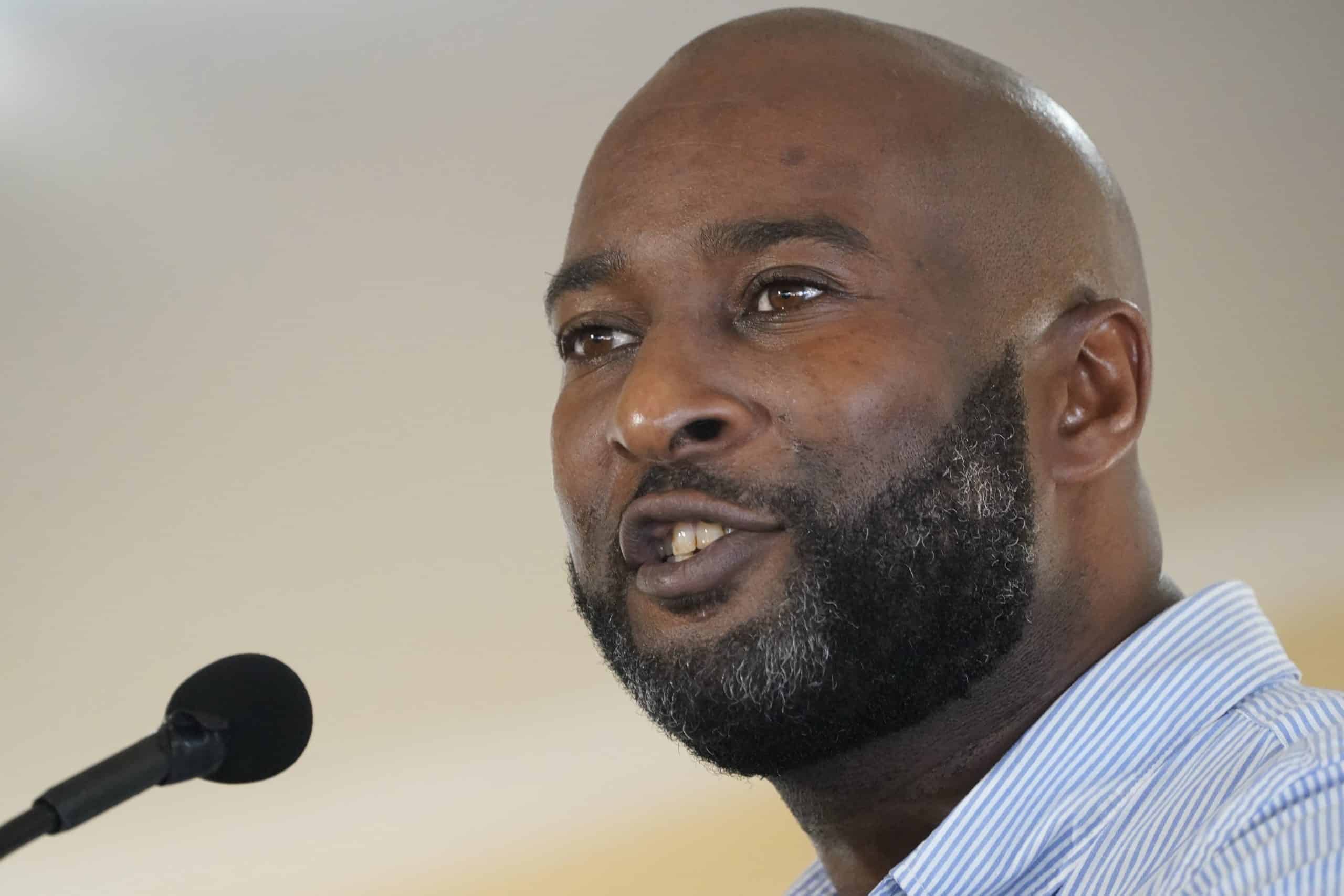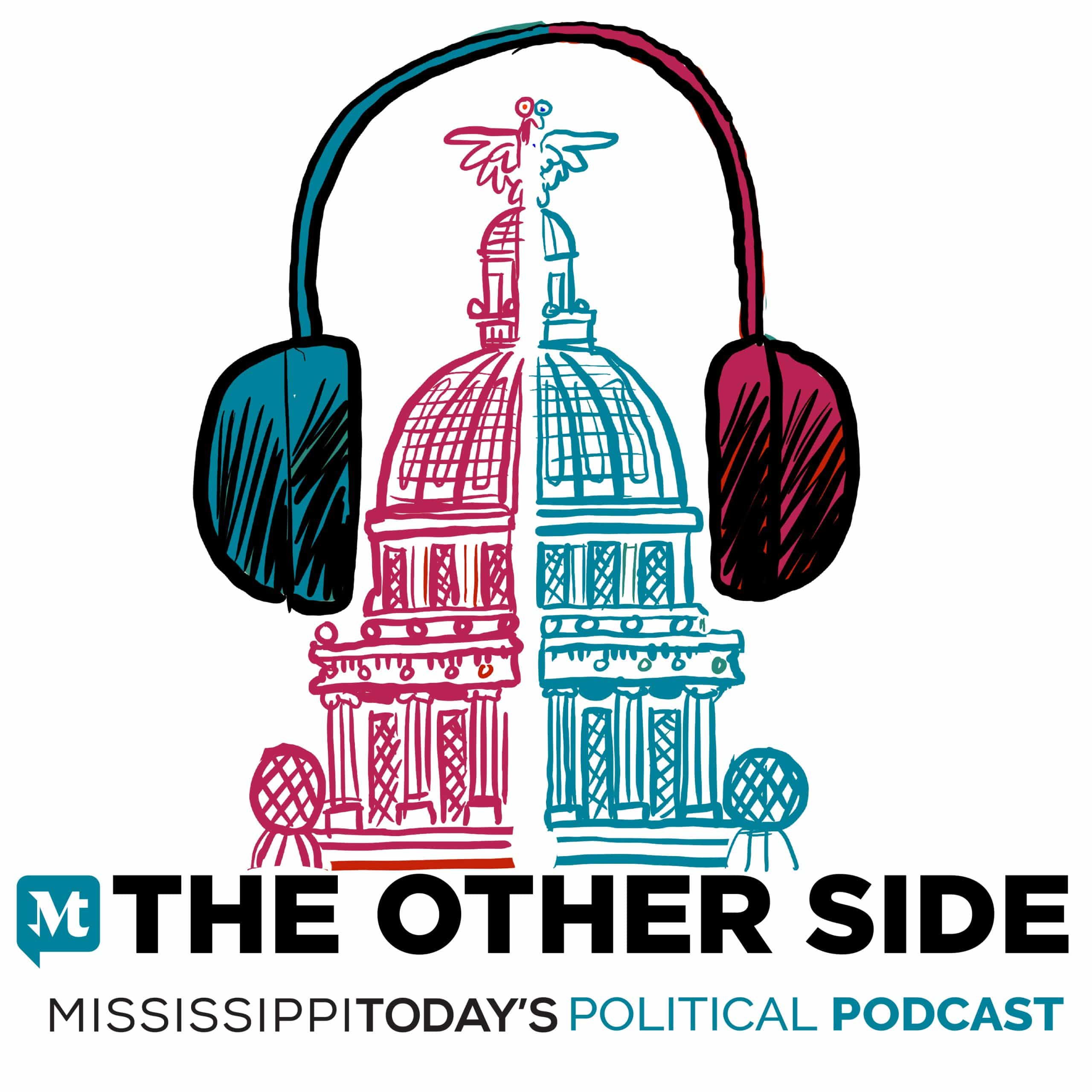Mississippi Today
Democrat who announced exit from Secretary of State race for health reasons was also under state scrutiny over residency

Democrat Shuwaski Young's abrupt Sunday announcement that he plans to drop out of the race for secretary of state for health reasons coincided with the Mississippi Elections Commission planning to meet in coming days to consider whether he was eligible to seek the office in the first place.
Young received a letter dated Aug. 15 from Logan Witcher, elections compliance officer in the Mississippi Secretary of State's office, informing Young that the state Elections Commission would soon review whether he was eligible to seek the statewide post because of residency issues. The letter, obtained by Mississippi Today on Monday through a public records request, claimed Young was voting in California as recently as 2020.
The letter to Young, along with his announcement that he is dropping out for health reasons, raises numerous questions.
Under Mississippi law, the state Democratic Party could name a replacement for Young if he is dropping out for health reasons. But if he was ruled ineligible to seek the post because of residency issues, the party likely could not replace him. If he is dropping out for health reasons before being ruled ineligible for the ballot, it is not clear whether he can still be replaced by the state party.
In an interview on Monday afternoon, Young said he withdrew solely because of his health, and questions about his residency “100% absolutely did not” play a role in that decision. He declined further comments on residency questions.
“What basically happened is there was an incident where my blood pressure was really out of whack, sky high, but I was on top of it, saw doctors, had medication,” Young told Mississippi Today. But one recent day, he said, while out at lunch, he had an “incident.”
“That particular day, I was in a full suit, it was sunny, about 12 or 1 p.m. It was just too much,” he said. “… That's when it hit me. I am just thankful to the emergency first responders, and folks at Golden Triangle Baptist Hospital where I had an overnight stay. It's just been an up-and-down medical situation for me … I'm going to focus on my family and my health, and when the time is right I'll make another run to serve the people of Mississippi.”
Young said he has talked with state Democratic Party leaders and would support anyone the party replaces him with in the race.
But the ultimate decision on whether the Democrat can exit the race lies with the three-member state commission, which is made up of Republican Gov. Tate Reeves, Republican Attorney General Lynn Fitch and Young's opponent Republican Secretary of State Michael Watson. State law requires Young to submit an affidavit to the commission specifying his reason for withdrawing his name from the ballot.
If a majority of the commission determines Young's health concerns are legitimate, they can vote to accept the affidavit. But they could also vote to reject the affidavit.
The state Elections Commission was scheduled to meet on Monday, Aug. 21, to take up questions concerning Young's eligibility, according to the letter. That meeting was postponed and its rescheduling has not been publicly announced.
The Mississippi Secretary of State's Office is tasked with checking the eligibility of statewide and legislative candidates and presenting those finding to the entire Elections Commission. Then the three members vote on candidates' eligibility before approving the statewide ballot for November.
The fact that Young was challenging incumbent Watson, who is on the commission, adds another dimension to the unique situation.
Cheikh Taylor, chair of the Mississippi Democratic Party, told the Daily Journal on Monday that the party planned to name a replacement for Young to run against Watson sometime this week, though he did not name a specific person. Taylor did not address the issue of whether Young can still be replaced if he is not eligible to run.
In the letter to Young, the Secretary of State's office said its research indicated that he was placed on the inactive rolls in his home county of Neshoba in early 2017.
Voter records indicated that Young cast ballots in California in 2018 and 2020, the letter said. The letter asks Young to provide documentation proving his citizenship.
READ MORE: Shuwaski Young faces residency questions in secretary of state run
The Mississippi Constitution requires a candidate for secretary of state to be “a citizen of the state” for five years “preceding the day of the election.”
Mississippi courts have historically looked at voting records as a factor to determine citizenship. According to the California Secretary of State's office, to vote in California someone must be “a United States citizen and a resident of California.”
If Young actually voted in California as recently as 2020, it's possible he does not meet the residency requirement. But earlier this year, Young told the Daily Journal he had maintained “joint residency” in Neshoba County while working in California.
Under state law, a candidate can drop out and be replaced because of health reasons or job-related conflicts. A candidate who dies before an election also can be replaced by the party.
In 2022, the issue of Young's residency came up in his 3rd District congressional campaign against incumbent Republican Michael Guest. But a candidate for the U.S. House in Mississippi is not required to live in the state, so at that time the issue was not fully vetted.
This article first appeared on Mississippi Today and is republished here under a Creative Commons license.
Mississippi Today
Podcast: The controversial day that Robert Kennedy came to the University of Mississippi

Retired U.S. Bankruptcy Judge Edward Ellington talks with Mississippi Today's Bobby Harrison and Geoff Pender about former U.S. Attorney General Robert Kennedy's speech at the University of Mississippi less than four years after the riots that occurred after the integration of the school. Ellington, who at the time headed the Ole Miss Speaker's Bureau as a law school student, recalls the controversy leading up to the speech.
This article first appeared on Mississippi Today and is republished here under a Creative Commons license.
Did you miss our previous article…
https://www.biloxinewsevents.com/?p=359978
Mississippi Today
On this day in 1961
MAY 20, 1961

A white mob of more than 300, including Klansmen, attacked Freedom Riders at the Greyhound Bus Station in Montgomery, Alabama. Future Congressman John Lewis was among them.
“An angry mob came out of nowhere, hundreds of people, with bricks and balls, chains,” Lewis recalled.
After beating on the riders, the mob turned on reporters and then Justice Department official John Seigenthaler, who was beaten unconscious and left in the street after helping two riders.
“Then they turned on my colleagues and started beating us and beat us so severely, we were left bloodied and unconscious in the streets of Montgomery,” Lewis recalled.
As the mob headed his way, Freedom Rider James Zwerg said he asked for God to be with him, and “I felt absolutely surrounded by love. I knew that whether I lived or died, I was going to be OK.”
The mob beat him so badly that his suit was soaked in blood.
“There was nothing particularly heroic in what I did,” he said. “If you want to talk about heroism, consider the Black man who probably saved my life. This man in coveralls, just off of work, happened to walk by as my beating was going on and said ‘Stop beating that kid. If you want to beat someone, beat me.' And they did. He was still unconscious when I left the hospital.”
To quell the violence, Attorney General Robert Kennedy sent in 450 federal marshals.
This article first appeared on Mississippi Today and is republished here under a Creative Commons license.
Mississippi Today
2024 Mississippi legislative session not good for private school voucher supporters
Despite a recent Mississippi Supreme Court ruling allowing $10 million in public money to be spent on private schools, 2024 has not been a good year for those supporting school vouchers.
School-choice supporters were hopeful during the 2024 legislative session, with new House Speaker Jason White at times indicating support for vouchers.
But the Legislature, which recently completed its session, did not pass any new voucher bills. In fact, it placed tighter restrictions on some of the limited laws the state has in place allowing public money to be spent on private schools.
Notably, the Legislature passed a bill that provides significantly more oversight of a program that provides a limited number of scholarships or vouchers for special-needs children to attend private schools.
Going forward, thanks to the new law, to receive the vouchers a parent must certify that their child will be attending a private school that offers the special needs educational services that will help the child. And the school must report information on the academic progress of the child receiving the funds.
Also, efforts to expand another state program that provides tax credits for the benefit of private schools was defeated. Legislation that would have expanded the tax credits offered by the Children's Promise Act from $8 million a year to $24 million to benefit private schools was defeated. Private schools are supposed to educate low income students and students with special needs to receive the benefit of the tax credits. The legislation expanding the Children's Promise Act was defeated after it was reported that no state agency knew how many students who fit into the categories of poverty and other specific needs were being educated in the schools receiving funds through the tax credits.
Interestingly, the Legislature did not expand the Children's Promise Act but also did not place more oversight on the private schools receiving the tax credit funds.
The bright spot for those supporting vouchers was the early May state Supreme Court ruling. But, in reality, the Supreme Court ruling was not as good for supporters of vouchers as it might appear on the surface.
The Supreme Court did not say in the ruling whether school vouchers are constitutional. Instead, the state's highest court ruled that the group that brought the lawsuit – Parents for Public Schools – did not have standing to pursue the legal action.
The Supreme Court justices did not give any indication that they were ready to say they were going to ignore the Mississippi Constitution's plain language that prohibits public funds from being provided “to any school that at the time of receiving such appropriation is not conducted as a free school.”
In addition to finding Parents for Public Schools did not have standing to bring the lawsuit, the court said another key reason for its ruling was the fact that the funds the private schools were receiving were federal, not state funds. The public funds at the center of the lawsuit were federal COVID-19 relief dollars.
Right or wrong, The court appeared to make a distinction between federal money and state general funds. And in reality, the circumstances are unique in that seldom does the state receive federal money with so few strings attached that it can be awarded to private schools.
The majority opinion written by Northern District Supreme Justice Robert Chamberlin and joined by six justices states, “These specific federal funds were never earmarked by either the federal government or the state for educational purposes, have not been commingled with state education funds, are not for educational purposes and therefore cannot be said to have harmed PPS (Parents for Public Schools) by taking finite government educational funding away from public schools.”
And Southern District Supreme Court Justice Dawn Beam, who joined the majority opinion, wrote separately “ to reiterate that we are not ruling on state funds but American Rescue Plan Act (ARPA) funds … The ARPA funds were given to the state to be used in four possible ways, three of which were directly related to the COVID -19 health emergency and one of which was to make necessary investments in water, sewer or broadband infrastructure.”
Granted, many public school advocates lamented the decision, pointing out that federal funds are indeed public or taxpayer money and those federal funds could have been used to help struggling public schools.
Two justices – James Kitchens and Leslie King, both of the Central District, agreed with that argument.
But, importantly, a decidedly conservative-leaning Mississippi Supreme Court stopped far short – at least for the time being – of circumventing state constitutional language that plainly states that public funds are not to go to private schools.
And a decidedly conservative Mississippi Legislature chose not to expand voucher programs during the 2024 session.
This article first appeared on Mississippi Today and is republished here under a Creative Commons license.
-
Our Mississippi Home6 days ago
Beat the Heat with Mississippi’s Best Waterparks
-
SuperTalk FM3 days ago
State auditor cracking down on Mississippians receiving unemployment benefits
-
Mississippi News Video6 days ago
Jackson has a gang problem
-
Kaiser Health News6 days ago
Medicaid ‘Unwinding’ Decried as Biased Against Disabled People
-
Local News3 days ago
Family files lawsuit after teen’s suicide in Harrison County Jail
-
Mississippi Today4 days ago
On this day in 1950
-
228Sports6 days ago
George County Pours Runs In 6A South State Title Victory At PRC
-
Our Mississippi Home2 days ago
Deer Fly Season on the Coast – Oh My!












































